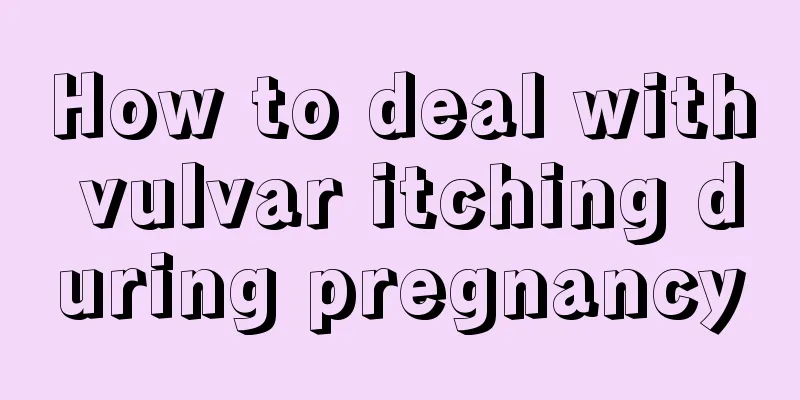Uterine fibroids are a bit painful

|
The symptoms of uterine fibroids are mostly irregular menstruation, increased leucorrhea, and patients may experience abdominal pain and other symptoms. Uterine fibroids can cause infertility, miscarriage or other gynecological diseases. If not treated properly, they may develop into malignant tumors. If you experience uterine pain, you should go to the hospital to check whether you have uterine fibroids. In normal times, you should be careful not to eat cold, spicy, and acidic foods, and keep a happy mood. Symptoms of uterine fibroids 1. Irregular menstruation Irregular menstruation with increased menstrual flow and prolonged menstrual period is the most common symptom of uterine fibroids. 2. Lower abdominal mass When the fibroids are small, no lump can be felt in the abdomen. However, when the fibroids gradually increase in size and the uterus exceeds the size of a 3-month pregnancy, they can be felt from the abdomen. Giant submucosal fibroids can prolapse outside the vagina, and patients may seek medical attention due to prolapse of the vulva. 3. Increased leucorrhea Intramural fibroids increase the area of the uterine cavity, increase the secretion of endometrial glands, and are accompanied by pelvic congestion, which leads to increased leucorrhea. Once submucosal uterine fibroids are infected, there may be a large amount of pus-like leucorrhea. The harm of uterine fibroids 1. Infertility or miscarriage If fibroid tissue appears in the uterine cornu, it may compress the entrance of the fallopian tube, preventing sperm from ascending to the fallopian tube and combining with the egg, thereby affecting conception; it may cause deformation of the uterus, hinder the implantation of the fertilized egg and hinder conception. Even if the fertilized egg has implanted, larger fibroids combined with pregnancy can easily cause miscarriage due to mechanical obstruction of embryonic development and uterine cavity infection. 2. Cause gynecological inflammation Uterine fibroids can cause pelvic congestion and infection, among which the infection caused by fibroids is mostly caused by pedicle torsion. After infection, abscesses may form in the fibroid tissue of a few patients, and suppuration may occur. At the same time, pathogenic bacteria after fibroid infection can invade other nearby organs, causing gynecological diseases such as adnexitis and pelvic inflammatory disease. 3. Secondary anemia Uterine fibroids can cause excessive menstrual bleeding in patients. Over time, patients will develop secondary anemia, manifested by symptoms such as general fatigue, pale complexion, palpitations and shortness of breath. 4. Malignant lesions In a small number of women, malignant changes in uterine fibroids may be sarcomas, which may cause vaginal bleeding in patients. Foods that should not be eaten by patients with uterine fibroids include: 1. Don’t be greedy for cold food: Women with poor gastrointestinal function should avoid eating raw, cold foods before and during menstruation, such as cold drinks, raw cold dishes, crabs, snails, clam meat, leeches, pears, persimmons, watermelons, bananas, bitter melon, mangosteen, mung beans, cucumbers, water chestnuts, grapefruits, oranges, etc., so as to avoid cold stagnation and blood stasis which may aggravate dysmenorrhea. 2. Don’t eat sour food: Acidic food has astringent effect, which makes the blood stagnant and is not conducive to the smooth flow and discharge of menstrual blood. Therefore, people with dysmenorrhea should try to avoid eating such food during menstruation. Acidic foods include rice vinegar, spicy and sour vegetables, pickles, pomegranates, green plums, bayberries, strawberries, star fruits, cherries, sour dates, mangoes, apricots, plums, lemons, etc. 3. Don’t eat spicy food: Some patients with dysmenorrhea already have heavy menstrual flow. Eating spicy, warm, and irritating foods will aggravate pelvic congestion and inflammation, or cause excessive contraction of the uterine muscles. |
<<: Are uterine fibroids serious?
>>: Uterine enlargement with fibroids
Recommend
What are the benefits of eating wax apples for pregnant women?
Women must pay attention to their nutrient intake...
What brand is the red car driven by the heroine of Vagabond? Model and price of the same car as Suzy in Vagabond
In the Korean drama "Vagabond", Bae Suz...
Does excessive and yellow vaginal discharge require treatment?
Leucorrhea is a normal physiological characterist...
Why do breast nodules grow so fast?
Nowadays, many women are found to have breast nod...
Keep your areola pink
Every female friend desires that her areola is pi...
How does a woman with exposed nostrils look like?
Women with exposed nostrils are very unsightly an...
What causes headaches during menstruation?
As a woman, because of the special body structure...
[Health and wellness] Here is a guide to early summer health and epidemic prevention
In May, there is abundant rainfall, sufficient su...
How to treat cervical erosion of degree 2?
Cervical erosion is a serious gynecological disea...
How to go downstairs when the water breaks
The amniotic fluid of pregnant women, also known ...
What tests are needed at 6 weeks of pregnancy
In the sixth week of pregnancy, some expectant mo...
What are the routine maintenance items for cars? How to maintain car lights?
Car maintenance refers to the preventive work of ...
Do you know the precautions for amniocentesis?
I believe every pregnant woman wants to know whet...
How long does it take to get menstruation after curettage?
There are many things that women need to pay atte...
Causes of low estradiol during pregnancy
I just got pregnant, but the hospital found out t...









